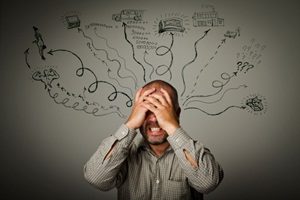
To give you an idea of the stressful world we live in, here’s my adaptation of a popular nursery rhyme:
“Old Mc Donald had a farm e-i-e-i-o.
And on that farm he had some stress e-i-e-i-o
With a lil’ stress here
And a lil’ stress there
Here some stress, there some stress,
everywhere some stress stress…”
Even if you don’t live on a farm, there are many things that you can be stressed about. You can stress about your health, you can stress about your work, you can stress about your holidays, you can stress about paying the bills, about your mortgage, about your family.
You can even stress about any bad thing that happens in your neighborhood or around the world. If you want to be stressed, there are millions of things that you can stress about.
When you are stressed, your body interprets it as an emergency situation. And it will prepare itself to tackle the emergency. The problem is, as there are no high blood pressure symptoms, you may not even know that these changes are taking place inside your body.
Stress and hypertension
Although a direct link between stress and high blood pressure is still unclear, stress can indirectly cause elevated levels of blood pressure by affecting the nervous system which in turn leads to the production of hormones that help raise blood pressure.
But to fully understand how stress causes hypertension, let me introduce you to two small glands that you might not be aware of: Adrenal glands. Your adrenal glands sit on top of each of your kidneys and are therefore also called supra-renal glands.
These glands produce nonessential (you don’t need them to live) hormones which help your body react to stress. Two important hormones are adrenaline and noradrenaline.
Adrenaline rapidly responds to stress by increasing your heart rate and rushing blood to the muscles and brain.
Noradrenaline works with adrenaline in responding to stress. It constricts the blood vessels. This results in high blood pressure.
These two hormones are called the fright, flight and fight hormones. If you are running, angry, or scared (all stress conditions), these hormones are released into the bloodstream causing a rise in blood pressure, and increased heart rate.
Now, if you’re running to catch a bus, your blood pressure shoots up, but it comes back to normal the moment you sit down in the bus. This temporary rise in blood pressure is not really harmful.
But if you’re stressed for days, even months due to some emotional problem, or because you are not able to pay your bills, or if you are suffering with poor health, then the blood pressure remains constantly elevated and can cause more harm.
Anti-hypertensive medications are helpful to a certain extent but they come with an array of side effects.
And since managing high blood pressure is a long-term project, positive lifestyle modification remains the cornerstone of controlling and managing high blood pressure and hypertension. By careful editing of your life, and changing certain habits, you can eliminate most (not all) sources of stress in your life.
So here are some tips to reduce stress and lower blood pressure naturally.
Let’s take a look at how stress builds up – it’s a little extreme, but it exemplifies the typical stressors in people’s lives.
Let’s say you wake up late in the morning and start rushing to get ready (stress 1). Because you’re rushing, you might spill your breakfast on your shirt, or nick yourself while shaving (stress 2). You rush out the door and rush back because you forgot your wallet (stress 3).
Now on your way to work, you’re caught in a traffic jam (stress 4). Your temper starts to flare when someone cuts you off (stress 5). You honk, curse, and arrive to work late (stress 6) and in a bad mood.
So even before you start your work you are consumed by stress. And as you can imagine the stress will just keep snowballing.
I know this is a bit extreme, but with a little simple management, these sources of stress can be eliminated. Here’s how:
1. Be punctual: Being late always stresses us out. Learn the habit of being early, and this stress disappears. Make a conscious effort to start getting ready earlier, and to leave earlier. Being early is a habit you could get used to.
2. Identify stressors: Take 10 minutes to think about what stresses you out during the day. What people, activities, things cause stress in your life?
Make a list, and see which of them can be eliminated. For those that can’t be removed, find ways to make them less stressful.
3. Eliminate unnecessary commitments: We all have many commitments in our life, work, kids, our spouses, things to do at home, side work, religious, hobbies, online activities…
Weigh the amount of stress they provide against the value you get. Edit brutally, and remove the ones that stress you out the most.
4. Simplify your to-do list: Attempting to do everything on your long to-do list will definitely stress you out. Simplify your to-do list to a few achievable tasks and you’ll enjoy the process much more.
5. Be organized: We’re all disorganized to some extent. Disorganization stresses us out, in terms of visual clutter, and in making it difficult to find stuff we need. Take time to get things in your life organized, starting with your desk and the papers in your home.
 6. Don’t be a control freak: Trying to control situations and people only serves to increase anxiety when it doesn’t work. Learn to let go, and accept the way other people work, and accept what happens in different situations.
6. Don’t be a control freak: Trying to control situations and people only serves to increase anxiety when it doesn’t work. Learn to let go, and accept the way other people work, and accept what happens in different situations.
Remember, the only thing you can control is yourself.
7. Stay away from multitasking: Having multiple tasks going on at the same time might seem productive, but in actuality it slows us down from focusing on a task and completing it – and it stresses us out in the meantime. Learn to single-task.
8. Eliminate energy drains: Certain things in our life just cause us to be more exhausted than others, with less value. Identify them, and cut them out. You’ll have much more energy and much less stress.
9. Slow down: Instead of rushing through life, learn to take it easy. Enjoy your food, enjoy the people around you, enjoy nature. This step alone can save tons of stress.
10. Relax: It’s important to take mini-breaks during your work day.
Stop what you’re doing, massage your shoulders and neck and head and hands and arms, get up and stretch, walk around, drink some water.
Go outside and appreciate the fresh air and the beautiful sky.
Life doesn’t have to be all about productivity.
11. Exercise: Exercising helps relieve the stress buildup; it gives you some quiet time to contemplate and relax, and just as importantly, it makes you more fit. A fitter person is better equipped to handle stress.
 12. Eat healthy: This goes hand-in-hand with exercise as a stress prevention method, of course. Become healthier and a major source of stress will disappear.
12. Eat healthy: This goes hand-in-hand with exercise as a stress prevention method, of course. Become healthier and a major source of stress will disappear.
While all of the above tips to reduce stress work wonders, there are some pseudo-stress relievers that you should definitely stay away from.
The reason I call them pseudo is because while they may temporarily reduce stress, they cause more damage in the long-run.
Avoid smoking, using pills, sleeping too much, drinking too much, and yes please don’t try to take out your stress on others. It just does not work.
Since everyone has a unique response to stress, there is no “one size fits all” solution to manage stress. No single method works for everyone or in every situation, so experiment with different techniques and strategies. You will find that as you focus on what makes you feel calm and in control, you will be able to lower blood pressure naturally.





No comments:
Post a Comment